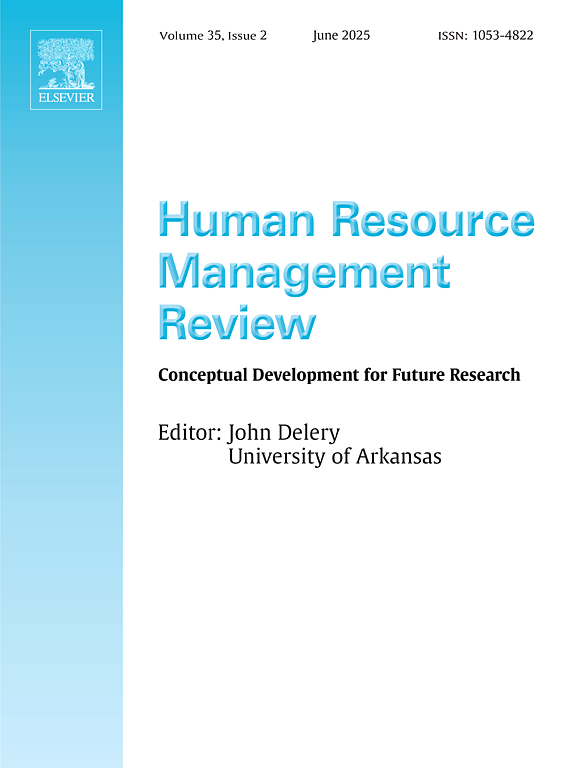What drives non-family CEO turnover in family firms?
Matthias Waldkirch, Mattias Nordqvist, and Leif Melin
Audio > Play / Stop
CeFEO's Authors
CeFEO counts more than 50 scholars and 30 affiliated researchers. Several studies and reports have consistently identified CeFEO as a leading research environment worldwide in the area of ownership and family business studies.
This research project, has been co-authored by the following CeFEO Members.
Reference
Spotlight highlights research-based findings only. If you’re interested in exploring this project further or delving into the theoretical and methodological details, we encourage you to contact the authors or read the full article for a comprehensive understanding.

Waldkirch, M., Nordqvist, M., & Melin, L. (2018). CEO turnover in family firms: How social exchange relationships influence whether a non-family CEO stays or leaves. Human Resource Management Review, 28(1), 56–67.
https://doi.org/10.1016/j.hrmr.2017.05.006

What is Spotlight?
Spotlight is an innovative online family business magazine designed to bridge the gap between cutting-edge research and the real-world needs of practitioners, owners, and policymakers. Drawing on the latest findings from the Centre for Family Entrepreneurship and Ownership (CeFEO) at Jönköping International Business School, Spotlight delivers insightful, accessible summaries of key research topics. Our mission is to keep the family business community informed and empowered by offering actionable insights, expert analyses, and forward-thinking strategies that enhance business leadership and ownership practices for long-term success.

This article is brought to you by the WIFU Foundation
Spotlight is generously supported by the WIFU Foundation, which promotes research, education, and dialogue in the field of family business. This partnership enables us to continue bridging academic insights and real-world practice for the advancement of responsible family entrepreneurship and ownership.
What keeps professional leaders committed to family-owned businesses?
Hiring a non-family CEO can inject professional expertise into a family business—but how long they stay depends on much more than just business performance. This research unpacks the hidden power of emotional bonds and social exchanges between non-family CEOs and family members across generations. Using a triadic relationship model and affect theory, it reveals when relationships keep CEOs loyal—and when they push them to walk away.
Hiring a non-family CEO can inject professional expertise into a family business—but how long they stay depends on much more than just business performance. This research unpacks the hidden power of emotional bonds and social exchanges between non-family CEOs and family members across generations. Using a triadic relationship model and affect theory, it reveals when relationships keep CEOs loyal—and when they push them to walk away.
In a growing number of family firms, the leadership baton is being passed not to a relative, but to a seasoned non-family CEO. While this trend reflects increasing professionalism and complexity in family enterprises, it also introduces a new challenge: how do you ensure these external leaders stay and thrive within a deeply relational, value-driven environment?
Turnover in any leadership role is disruptive. But in family firms—where business, emotion, and legacy intertwine—CEO departures can be especially destabilizing. This article delves into the critical yet underexplored role of interpersonal relationships in shaping the tenure of non-family CEOs. Through the lens of social exchange and affect theory, the authors uncover the emotional mechanisms that influence whether a CEO stays—or decides to leave.
What We Studied
Drawing on the affect theory of social exchange (Lawler, 2001), the authors construct a conceptual model that moves beyond typical binary frameworks of leader–owner relationships. Instead, they examine a triadic exchange relationship involving:
- The non-family CEO
- The current generation of the owning family
- The next generation of the family
This triad reflects the reality of many family firms, particularly during succession phases. The authors investigate how emotional attachments (or detachments) emerge through different forms of social exchange—reciprocal, negotiated, productive, and generalized—and how these attachments influence CEO turnover.
Rather than relying on financial performance or governance structures alone, this model places emotional dynamics at the center of CEO retention.
Key Insights
1. The CEO–Family Relationship Is a Triad, Not a Dyad
Family firms are not static. Leadership often involves overlapping generations with different roles, expectations, and emotional investments. By treating the CEO–family dynamic as a triad, the study captures the complexity of multiple, simultaneous relationships—each of which affects the emotional climate.
This triadic approach is particularly valuable during succession, when leadership responsibilities shift and different generations have diverging views on strategy, values, and control.
2. Emotional Attachment Is Built Through Exchange
Not all relationships are created equal. The authors define four types of social exchanges that vary in how they foster emotional bonds:
- Generalized Exchange: Indirect support without immediate reciprocation (e.g., mentoring).
- Productive Exchange: Joint efforts to achieve shared outcomes (e.g., strategic planning).
- Reciprocal Exchange: Direct, informal give-and-take (e.g., helping with tasks).
- Negotiated Exchange: Explicit agreements (e.g., setting performance expectations).
The degree to which these exchanges foster affective attachment (emotional loyalty) or detachment (emotional distance) strongly predicts whether a non-family CEO stays.
3. Balance in the Triad Matters
A central insight is that balance—equal power and dependence among the triad members—encourages successful exchanges and emotional bonding. Conversely, imbalances (where one actor is weaker or more dependent) tend to produce failed exchanges and emotional frustration.
Depending on who is imbalanced, the outcomes differ:
- Imbalance toward the next generation: Their inexperience may frustrate the CEO unless exchanges are adjusted (e.g., through negotiated mentoring).
- Imbalance toward the current generation: If they can't let go, they may dominate exchanges, crowding out the CEO and next generation.
- Imbalance toward the CEO: If the CEO lacks inclusion or respect, they may feel alienated, leading to high turnover.
4. Emotional Bonds Are Stronger Than Contracts
Even in formalized settings like boardrooms, the study reveals that the emotional quality of relationships often outweighs formal governance. Non-family CEOs who experience emotional fulfillment and group identity with the family are more likely to forgive occasional conflicts and remain committed—especially when joint successes create pride and mutual trust.
Takeaways for Family Business Practice
1. Diagnose the Triad Early
Understand the current emotional balance between the CEO and family generations. Are expectations aligned? Is trust present? Does the CEO feel empowered—or tolerated?
A simple stakeholder mapping exercise assessing perceived fairness, emotional support, and role clarity can uncover imbalance risks before they escalate.
2. Choose the Right Exchange Model
Different family dynamics require different relational strategies. For instance:
- In early succession, negotiated exchanges (clear expectations) may prevent frustration.
- Where trust is high, productive exchanges (shared goals) can deepen commitment.
- For onboarding or mentoring, generalized exchanges work best.
Being deliberate about the kind of interaction fostered can strengthen affective attachment and reduce CEO turnover.
3. Address Power Imbalances
Rather than ignoring them, proactively manage asymmetries in the triad. For example:
- Support the next generation through structured mentoring and progressive involvement.
- Help the current generation transition with dignity through advisory roles.
- Empower the CEO by involving them meaningfully in family strategic dialogues.
Power imbalances, if left unmanaged, can breed resentment and miscommunication, leading to emotional detachment.
4. Look Beyond the Résumé
While competence matters, cultural and emotional fit are critical for CEO longevity in family firms. Assess how well a CEO understands and respects the family’s values, communication style, and legacy.
Internal candidates may better grasp these subtleties, but external hires can succeed with proper onboarding and relational alignment.
Impact
This research makes a powerful case for reframing CEO turnover in family firms not just as a business or HR issue, but as a relational and emotional phenomenon.
By emphasizing the quality of social exchanges and the role of emotional attachment, the study challenges the idea that professional performance alone secures retention. It also introduces a practical framework—balancing the triad—that family firms can apply to diagnose and improve CEO–family relationships.
Moreover, it highlights the critical, yet often overlooked, role of the next generation in shaping these dynamics. Their relationship with the CEO can be a make-or-break factor in succession success.
Recommendations
- For Family Business Owners: Prioritize emotional intelligence when recruiting or evaluating a non-family CEO. Ensure the triad relationship is consciously nurtured, not left to chance.
- For Non-Family CEOs: Invest in building rapport across generations. Understand the family's values and be flexible in your leadership approach to build trust and attachment.
- For Advisors and Boards: Use the triad framework to facilitate honest conversations about expectations, roles, and emotional undercurrents in leadership transitions.
- For Researchers: Explore how variations in CEO origin (insider vs. outsider), multi-family governance, and cross-generational coalitions influence triadic exchanges and turnover patterns.

CeFEO's Authors
CeFEO counts more than 50 scholars and 30 affiliated researchers. Several studies and reports have consistently identified CeFEO as a leading research environment worldwide in the area of ownership and family business studies. This research project, has been co-authored by the following CeFEO Members.
Reference
Spotlight highlights research-based findings only. If you’re interested in exploring this project further or delving into the theoretical and methodological details, we encourage you to contact the authors or read the full article for a comprehensive understanding.

Waldkirch, M., Nordqvist, M., & Melin, L. (2018). CEO turnover in family firms: How social exchange relationships influence whether a non-family CEO stays or leaves. Human Resource Management Review, 28(1), 56–67.
https://doi.org/10.1016/j.hrmr.2017.05.006

What is Spotlight?
Spotlight is an innovative, AI-powered, online family business magazine designed to bridge the gap between cutting-edge research and the real-world needs of practitioners, owners, and policymakers. Drawing on the latest findings from the Centre for Family Entrepreneurship and Ownership (CeFEO) at Jönköping International Business School, Spotlight delivers insightful, accessible summaries of key research topics. Our mission is to keep the family business community informed and empowered by offering actionable insights, expert analyses, and forward-thinking strategies that enhance business leadership and ownership practices for long-term success.

This article is brought to you by the WIFU Foundation
Spotlight is generously supported by the WIFU Foundation, which promotes research, education, and dialogue in the field of family business. This partnership enables us to continue bridging academic insights and real-world practice for the advancement of responsible family entrepreneurship and ownership.












